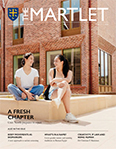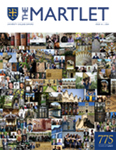A View from Myanmar
 Please note that this article was written in July 2020.
Please note that this article was written in July 2020.
Dr Michael Marett-Crosby (1987, History) is a Trustee of Prospect Burma, The Rangoon General Hospital Reinvigoration Charitable Trust, the Lucy Faithfull Foundation, and the Irrawaddy Policy Exchange. He frequently travels to Myanmar to advance health and education projects in the country and to support the implementation of the late Dr Kofi Annan’s Rakhine Advisory Commission.
In the great, red brick hospital in the centre of Yangon, staff have hauled cylinders of oxygen upstairs by hand for years. You can see where the near disasters have chipped of shards of stone. Now, with COVID-19, oxygen is more than ever life for patients on the floors above. And the old ways, with their familiar dangers, become today’s problems.
Except that we are far away. The charities I run, many with the long-term support of UK Aid, have had to leave, ordered home. COVID-19 makes neighbours into strangers again, and the safeties that our insurers had taken for granted – flights out, medical evacuations – are not there anymore. The last planes were full of aid workers, watching Myanmar shrink as we flew into the pandemic at home. It is one of the many dreadful ironies of these last months that it has proved to be more dangerous in London than Yangon.
So, what to do? Looking back at my notes from March, I recall paralysis, the unknown and the unplanned. This found expression in endless, aimless online meetings convened by the UN and others. These are still happening, though more languidly.
And there we might have stayed, I think, numbed by the shock of distance – but for friendship.
I have been running charities in Myanmar for a decade. That is a long time in a sector where job churn is relentless, and unfailingly to the detriment of those whom overseas aid seeks to help. But the bonds made over that time gave us a way to carry on.
Slowly, tentatively, we found ways of working across continents and time zones, forms of conversation that could plan and fix and build. The 5.30am call remains the norm. Doctors and professors comment that we become more unkempt with each Zoom call.
Some parts of the charities’ work have improved. We have done more for healthcare in these last months, and with less money, than ever before. In need, our Myanmar partners did not let us stay remote. Exhausted doctors across the UK spend their early mornings training colleagues in the intricacies of ICU. In the evening, I join the Californian team who are training ambulance medics in how to keep people alive.
The same proved true, with more challenges, in education. The pivot to digital learning is not easy, but in a country where education is the means to make a different future possible, we are perhaps more confident now that fewer children will be left behind. We have had more applications this year than ever for our international scholarships – this year the young people of Myanmar want to study epidemiology and economics.
Some things, of course, are harder. In the refugee camps, COVID-19 is the ultimate nightmare, and access to information about the real situations there is thin. We need to be back. But, again, there was only a choice between abandonment and finding other ways to work. Gone were the helicopter rides and meetings on the ground. Instead, a way of building durable solutions for the people locked in hopelessness, perhaps starting a little more with them and less with us.
Today, the first British Airways plane for months is landing where I live. Tremulously, the world is reconnecting. No doubt there will soon be flights and I will be on them – the familiar dark across Central Asia, sleepless dawns in Bangkok Airport. Then we will return, no doubt, to some old ways. COVID-19 will have changed some of the ways we work. But I will go back because the bonds of connection did endure the gap and, renewed, can be stronger for the next time.
And the oxygen pipes designed continents away, surveyed remotely and fitted by smart Myanmar engineers on smartphones? They work well. The sick can breathe.
This feature was adapted from one first published in Issue 12 of The Martlet; read the full magazine here or explore our back catalogue of Martlets below:
Published: 12 April 2021

















